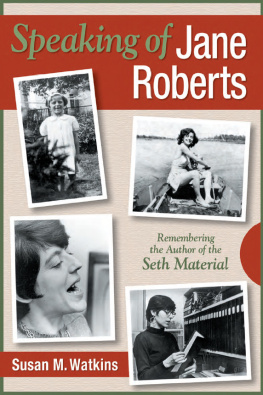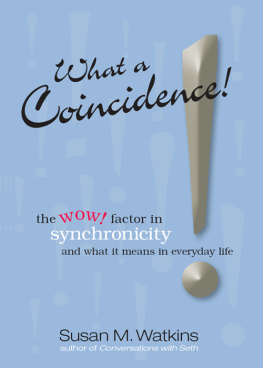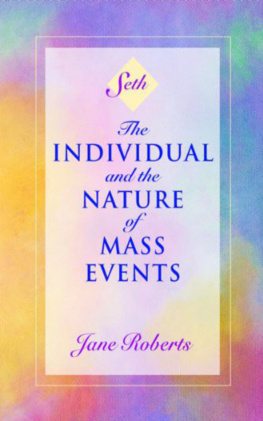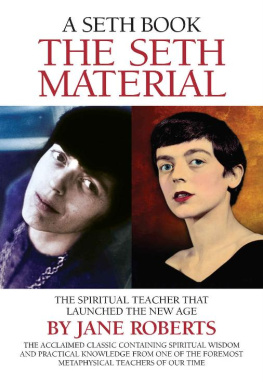Acknowledgments
Though writers ultimately fashion their work in isolation, they are never really alone. Mary Dillman works tirelessly in the Jane Roberts archives at Yale University in New Haven, Connecticut, and on my behalf researched and copied lengthy batches of material, which Robert F. Butts very kindly gave me permission to use as I wished.
I am grateful to everyone who sent me dreams and memories of Jane Roberts. Your candid responses let me know that my own recollections might have value in the world at large.
Susan Thornton and Barbara Coultry have commiserated with me about the writing process for many years. They have never failed to supply me with empathy and approval, and for this I am in their debt. Editor Susan Ray plied her considerable organizational skills to a manuscript that originally meandered all over the place, as memories will. And my cousin Mike Young has always helped me see with wiser eyes through many a glass darkly.
Other Books of Interest from
Moment Point Press
Conversations with Seth
the story of Jane Roberts's
ESP class
Susan M. Watkins
Three Classics in Consciousness By
Jane Roberts
Adventures in Consciousness
Psychic Politics
The God of Jane
Consciously Creating Each Day
a 365 day perpetual calendar of
spirited thought
from voices past and present
Susan Ray, editor
Lessons from the Light
what we can learn from
the near-death experience
Kenneth Ring, Ph.D.
Mind into Matter
a new alchemy of
science and spirit
Fred Alan Wolf, Ph.D.
for more information
please visit us at
www.momentpoint.com
Nobody Ever Asks Me This
I t's a gorgeous fall day in October, 1994. I'm sitting with my friend Debbie Harris at a sidewalk caf in the village of Watkins Glen, New York, drinking cappuccino. The air is bright and crisp, a chilly breeze coming off Seneca Lake a few blocks away. Groups of late-season tourists are walking around the downtown streets. Ironically, as it turns out, the idea of putting together a memoir of Jane Roberts, using the collected memories and dreams of others, has just come to me that morning. In fact I'm so full of the idea I feel as though I'm about to explode. Already I've talked Debbie into contributing her journal notes from the weeks she visited Jane in the hospital. This will be a snap, I think to myself. Easy as pie.
At that exact moment, as if on cue, a woman steps out of a passing trio and comes over to our table. She's maybe in her late thirties, pretty, slender, dark blonde hair, and she's staring directly at me with a wide-eyed, eager expression.
Somewhere in my head, an alarm bell switches to on.
She asks me if I'm Sue Watkins. If she mentions her own name, I don't remember it. As soon as I reluctantly admit to being the personage in question, she leans over and whispers, Do you know Abraham?
I thinkAbraham? Abraham
Lincoln?
the Old Testament guy?
her dog's name and it's missing?
a town bigwig?
a rock-and-roll tune?
None of this makes any sense. So I take the bait and ask, who's Abraham? And now her voice turns heavy with significance.
Abraham is the name of a group of entities who speak through some people over near Ithaca, she tells me. And what we'd all really like to know is, where has Seth gone now that Jane is dead?
Silently, I thinkOh, crap. Memoir, schmemoir. For-get it.
Looking back on this incident, I realize that the woman's question was innocent enoughI suppose. But sitting at the caf table that afternoon, my three dollar cappuccino not to mention my new book idea going cold, I wasn't so generous with my response.
I say to hersomewhat nastily, I'm afraidYou know, nobody ever asks me where the hell Jane's gone now that Jane is dead. And the woman just stares at me, so I add, with sudden sarcastic inspiration, Where did Picasso's paintings go after he died? Ever think of that?
She steps back a pace, glances toward her friends, who are windowshopping up the street. I lean across the table, half rising from my chair. I'm serious, I say, almost snarling. That question was serious. Where do you think Picasso's paintings went when he died? Huh? Where?
With that, something in the woman's demeanor closes down; her face turns to slate, and immediately, I'm a bit ashamed of myselfjust a bit. I wasn't aware that he had any unfinished ones, she says. Her voice is as cool as the Seneca Lake shore breeze.
What I'm getting at is that Seth was a masterwork of artJane's art, I say. She made the artwork possible.
But Seth has to be somewhere! the woman insists. He should be speaking through someone else by now!
Oh, come on, I snort, disgusted anew. Jane wasn't just a piece of meat that Seth animated for his own nefarious purposes! If that were the case, why not just use a piece of meatless irksome! No arguing! Doesn't require sleep!
Well, these entities will tell us where Seth is, she informs me in a snide tone, one plenty equal to my own snide tone. With obvious disappointmentSue Watkins has turned out to be a close-minded shitheadshe turns away and joins her friends and all walk on up the block without looking back.
That was quite a scene, Debbie says, also not looking at me.
Was I too nasty?
Debbie hesitates, decides to tell a fib. No, I don't think so, she says. No, you weren't bad at all. Not really. Nah.
Later, thinking about it, I did feel guilty for my tone (though not for my words). The woman was only looking to find her own way, as everyone must. And really, how odd, that during the entire disaster of a conversation, an image kept coming to me of Jane's physical position as it often was in ESP class: sitting in a chair, holding a glass of wine and (more often) a cigarette, being pressed by earnest people filled with the possibility of Seth's appearance and whatever wondrous secrets he might unveil. I ought to know. I'd done the same, often enough.
Part of me was infuriated by the whole caf scene. Part of me had enjoyed it. Despite our mutual rancor over the results, on some level that woman and I had sought out the encounter for our own reasons. At least we werewell, tryingto exchange something original, and ultimately inexplicable, about the nature of the universe. Maybe. Besides, she hadn't come out of nowhere, with no connection to the moment. We'd responded on some level to one another before either of us said a word, and in a way, we'd each voiced the other's worst expectations about the so-called psychic arena. A smooth and crafty response from the universefrom the mirror of our selves.
Jane often said, I speak for the Seth in all of you. She was right.

I FIRST ENCOUNTERED JANE ROBERTS in December of 1963, though I didn't know it at the time. I was nineteen, a freshman at Syracuse University, already bored with my courses and unsure of an increasingly tenuous world; instead of studying for finals I picked up a Rod Serling science fiction anthology and quickly found myself absorbed in the tale of The Chestnut Beads. It was a story I never forgot, and a story that its authorJane Robertsand I would later discover contained the prescient seeds of a future connection between us. The first time we actually met was in 1967, at a raucous New Year's Eve party she and Rob threw in their small second-floor apartment in my home town of Elmira, New York. I was there with my gay friend Dan Stimmerman, who'd been pressing me for weeks to come over to Jane's place with him and meet this woman who spoke, as he put it, for the spirit of a dead person. (Initially I'd refused, thinking, Yeah, right. Yuk.) By then, Jane had been speaking for Seth for almost exactly four years and had published
Next page







